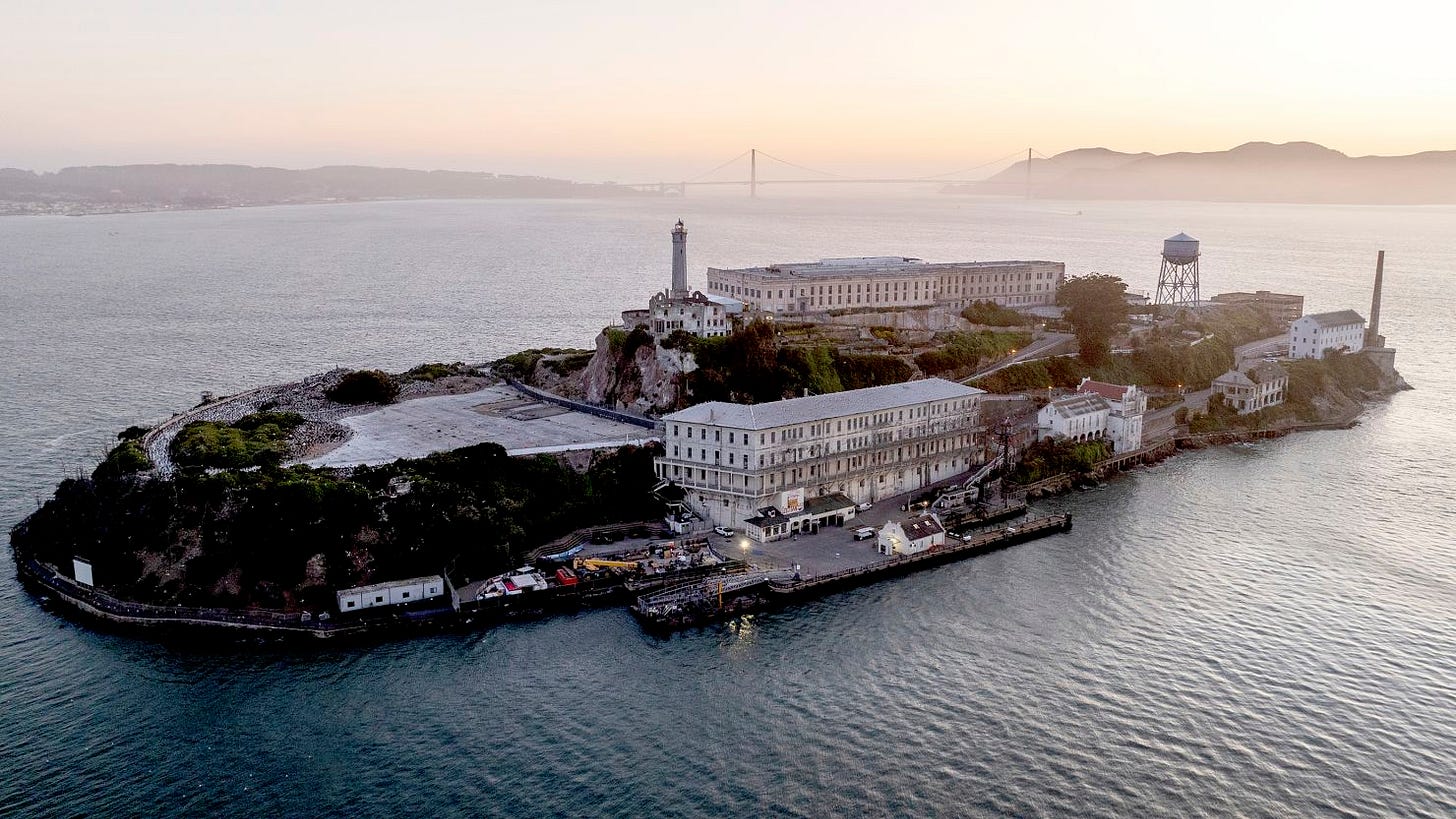Alcatraz Really Back at 3x the Cost of Other Prisons? Why Ending Agent Orange Cleanup in Vietnam is a Big Deal, Illegal Immigrants offered $1,000 Cash to Self-Deport (The Five for 05/06/25)
Hey, welcome to The Five, a publication about the stories that matter, but don’t always make the front page.
Before we begin…a couple of case studies about my day job, Manx, an agency focused on scaling brands, simply, through AI and content creation.
If you want to know how to get your brand to show up in ChatGPT—click here.
And if you think showing up on Google will make you money—think again. Do it wrong, and you’ll have less sales. Click here for more on that.
Need help with your company/brand/nonprofit/idea ASAP? Send me a message.
Now, let’s dive into the news.
[one]
Somehow, there’s controversy over the most non-controversial political move in 2025.
The Trump administration banned funding for gain-of-function research, which many (most?) people believe was the cause of the COVID pandemic.
The research, which is also known as "dual-use" research, involves experimenting with viruses and other pathogens that have the potential to trigger a pandemic. Those studies could discover how infectious agents might become more transmissible or make people sicker.
This field has long been controversial because of fears that scientists could make a more dangerous pathogen in their lab that could get out and cause a pandemic. Those concerns have led to many efforts over the years to more tightly monitor and control this research.
But gain-of-function research became especially controversial and politically polarized during the COVID-19 pandemic. One theory for how the pandemic started says that the SARS-CoV-2 virus, which causes COVID-19, spilled out of a Chinese government laboratory in Wuhan, China.
"Many people believe that gain-of-function research was one of the key causes of the COVID pandemic that struck us in the last decade," said White House secretary Will Scharf. "What this executive order does first of all, it provides powerful new tools to enforce the ban on federal funding for gain-of-function research abroad. It also strengthens other oversight mechanisms related to that issue and creates an overarching strategy to ensure that biomedical research in general is being conducted safely."
Many scientists refute that theory, arguing that the weight of the evidence suggests the pandemic started when someone in China was infected by a wild animal carrying the virus.
Many scientists refute that theory, arguing that the weight of the evidence suggests the pandemic started when someone in China was infected by a wild animal carrying the virus.
That said, many scientists also agree that better oversight is needed because of the possible risks. But many worry a moratorium would be too broad and could stifle safe research and that is necessary to prevent or respond to the next pandemic.
"If we ban it, the next time another COVID virus comes through we won't have the data to quickly find new treatments, screening and even preventative measures," says Kristin Matthews, a fellow in science and technology policy at Rice University's Baker Institute for Public Policy.
NPR’s reporting here…is certainly worth noting. Particularly that they didn’t find any scientists to go on record and state that COVID didn’t escape from a lab.
The reasoning here is also quite inbred. “The the next time we have a COVID style pandemic, we don’t be ready.”
Well, if government funded programs don’t CAUSE a COVID style pandemic, we don’t need to be ready.
[two]
So…are we really doing this? President Trump is calling for the re-opening of Alcatraz.
But federal corrections experts and historians caution that while such a project may be especially "symbolic" to Trump, any plan would be incredibly expensive and inefficient, particularly when the federal government's mission is to slash spending and prisons remain strained by staffing shortages.
"You'd be going in and basically removing a national landmark just to set up a prison that literally would be for the optics mostly, because it doesn't make the most sense financially to establish something like that there," said Michael Esslinger, who has written five books about Alcatraz's history and estimates he has visited the island at least 500 times.
Before Alcatraz was closed, it was determined that it would take at least $4 million to renovate it and that the physical isolation of the island was a major reason it cost so much to maintain. For example, fresh water had to be barged to the island every week.
In a news release issued in 1962, BOP Director James Bennett said it was not an "economically sound policy" to invest millions of dollars to rehab Alcatraz. Housing an inmate in Alcatraz cost more than three times what it cost in Atlanta, the BOP said.
It's unclear how much it would cost to build a new prison on Alcatraz from scratch. The BOP's newly installed director, William Marshall III, said in a statement Monday that he has ordered an assessment on "next steps" for a reopened U.S. penitentiary.
"USP Alcatraz has a rich history," Marshall said. "We look forward to restoring this powerful symbol of law, order, and justice. We will be actively working with our law enforcement and other federal partners to reinstate this very important mission."
For comparison, a new federal prison that would hold 1,400 inmates in Letcher County, Kentucky, near the Virginia border, is estimated to cost more than $500 million.
YouTube news commentator Tim Pool may have nailed it when he responded to this story simply by saying “Well…Trump is an old man.”
Alcatraz is the best tourist trap I’ve ever visited, and part of me would hate to see it inaccessible to the public. And this certainly goes against the Trump admin’s DOGE efforts, as there’s just not efficiency in delivering fresh food and water daily via barge to an island prison.
On the flip side…there is a case to be made for Alcatraz as a psychological symbol. I hate this because I (weirdly) love Alcatraz (thanks to an Unsolved Mysteries episode in the 1980's—elder Millennials and Xer’s…you know what I’m talking about), but it’s not surprising that a man who got famous by slapping his name on buildings wants a really obvious prison a a symbol of law and order.
And I doubt anyone has time to watch it…but what the heck. Here’s the episode on Alcatraz that captured my imagination in early elementary school.
[three]
Israel hit Yemen early this morning, bombing the nation’s Houthi-controlled international airport.
Israel’s military said Tuesday it launched airstrikes against Iranian-backed Houthi rebels in Yemen that fully disabled the country’s international airport in the capital, Sanaa.
The strikes came after Israel launched similar attacks on Monday in retaliation for a Houthi missile strike the previous day on Israel’s international airport.
The Houthis’ satellite news channel al-Masirah reported the strikes, confirming the airport had been hit. Several power plants were also struck, Israel’s military said.
Footage aired on Israeli television showed thick black plumes of smoke rising above the skyline of Sanaa. Social media video purported to show multiple strikes around Sanaa, with black smoke rising as the thumps of the blast echoed against the surrounding mountains.
There was no immediate information on any casualties.
The strike came shortly after the military issued a warning on social media for people to evacuate the area of Yemen’s international airport.
“We urge you to immediately evacuate the area of the airport and to warn anyone nearby to distance themselves immediately,” spokesperson Avichay Adraee wrote on social media Tuesday, attaching a map of Sanaa International Airport. “Failure to evacuate the area endangers your lives.”
Israel’s defense minister, Israel Katz, said the strike should be seen as a warning to the “head of the Iranian octopus,” which he said bears direct responsibility for attacks by the Houthis against Israel.
On Monday, Israel targeted Iranian-backed Houthi rebels in Yemen’s Red Sea province of Hodeida, killing at least one person and wounding 35. The rebels’ media office said at least six strikes hit the crucial Hodeida port, while others hit a cement factory in the district of Bajil, 55 kilometers (34 miles) northeast of Hodeida. The Houthi-run Health Ministry said the strikes killed at least four people and wounded 39 others.
[four]
The Trump admin is offering cash to illegal immigrants who volunteer to exit the U.S.
Illegal immigrants who self-deport will receive a $1,000 stipend under a plan that the Trump administration says will protect law enforcement and save American tax dollars, the Department of Homeland Security announced on Monday.
Along with giving illegal immigrants a $1,000 stipend, Fox News reported that the Trump administration would also pay for the cost of airfare. The total cost for the stipend and airfare would be around $4,500 on average, a significant reduction from the estimated $17,000 it costs the federal government to detain and deport an illegal immigrant, according to DHS, which added that illegal immigrants would not receive the stipend until it was verified that they had left the United States.
“If you are here illegally, self-deportation is the best, safest and most cost effective way to leave the United States to avoid arrest,” Homeland Secretary Kristi Noem wrote on X. “DHS is now offering illegal aliens financial travel assistance and a stipend to return to their home country through the CBP Home App.”
“This is the safest option for our law enforcement, aliens and is a 70% savings for US taxpayers,” Noem added. “Download the CBP Home App TODAY and self-deport.”
[five]
Support for the cleanup of Agent Orange and
For almost a decade, as America tried to stamp out enemy fighters lurking in the jungle, US aircraft doused Vietnam with 20 million gallons of herbicides in a campaign codenamed Operation Ranch Hand. Forests were stripped bare; rice paddies left barren.
In the end, the toxic mission could not halt the Northern Vietnamese communists – who, exactly 50 years ago, delivered a final, humiliating blow to the US and its allies, bursting through the gates of South Vietnam’s presidential palace in T-54 tanks.
Saigon fell on April 30, 1975, bringing an end to decades of war and triggering the country’s reunification. Now one of the world’s fastest-growing economies and a popular tourist hotspot, Vietnam is this week marking 50 years of peace with military parades, a drone light show and picnics on streets lined with red and gold flags.
But for millions of people, the struggle against Operation Ranch Hand never ended.
Herbicidal warfare – especially the use of Agent Orange – has left a toxic legacy of environmental damage and severe health issues, from cancer to birth defects. Estimates suggest as many as three million people have been affected, including roughly 150,000 children born with serious developmental problems.
Yet efforts to clean up contamination and help those affected are now in jeopardy, another victim of the chaos caused by the Trump administration’s sweeping aid cuts. According to a Washington Post tally, at least 34 of 43 USAID contracts in Vietnam were axed.
On the surface, this doesn’t sit right with me. It’s quite possible to be against most (or all) foreign aid (if that’s your view) and still think the U.S. should clean up what we destroyed with a poison.
I asked AI to summarize what contracts were cut:
Since the normalization of diplomatic relations in the 1990s, the United States and Vietnam have partnered on various projects to remediate environmental damage and assist those affected by Agent Orange. Key initiatives included:
Bien Hoa Air Base Cleanup: A major project aimed at decontaminating one of the most heavily polluted sites in Vietnam. The plan involved excavating and treating approximately 500,000 cubic meters of dioxin-contaminated soil over a decade, with an estimated cost of $430 million.PBS: Public Broadcasting Service+1Time+1
Humanitarian Aid Programs: Support for Vietnamese individuals suffering from health issues linked to Agent Orange exposure, including funding for medical treatment and rehabilitation services.Wikipedia
Unexploded Ordnance (UXO) Clearance: Efforts to remove landmines and other unexploded munitions remaining from the war, enhancing safety and enabling land use.PBS: Public Broadcasting Service
War Legacy Documentation: Projects aimed at educating the public and preserving the history of the war's impact, such as museum exhibits detailing U.S. remediation efforts.PBS: Public Broadcasting Service+1AP News+1
Although some funding was later reinstated under political pressure, the abrupt disruptions have strained U.S.-Vietnam relations and raised concerns about the reliability of U.S. commitments to addressing war legacies.
If the U.S. wants to decouple from China, we need Vietnam on our side. The use of Agent Orange was stupid and horrific…and, as painful as it is to keep paying a half century later, cutting this program doesn’t seem to make ethical or practical sense in advancing the interests of our country.
Until the next one,
-sth






